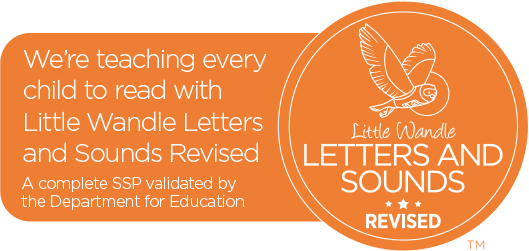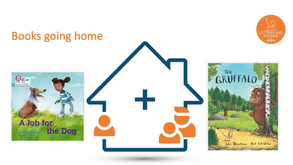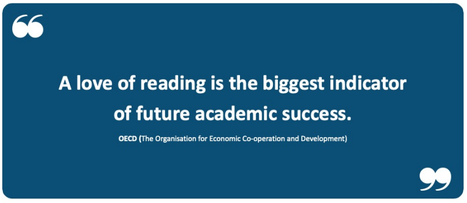Our Phonics Scheme - Little Wandle
At Hathern, we believe that all our children can become fluent readers and writers. This is why we teach reading through Little Wandle Letters and Sounds Revised, which is a systematic and synthetic phonics programme.
We start teaching phonics in Foundation and follow the Little Wandle Letters and Sounds Revised progression, which ensures children build on their growing knowledge of the alphabetic code, mastering phonics to read and spell as they move through school. As a result, all our children are able to tackle any unfamiliar words as they read.
We also model the application of the alphabetic code through phonics in shared reading and writing, both inside and outside of the phonics lesson and across the curriculum. We have a strong focus on language development for our children because we know that speaking and listening are crucial skills for reading and writing in all subjects.
Comprehension
At Hathern, we value reading as a crucial life skill. By the time children leave us, they read confidently for meaning and regularly enjoy reading for pleasure. Our readers are equipped with the tools to tackle unfamiliar vocabulary. We encourage our children to see themselves as readers for both pleasure and purpose.
Because we believe teaching every child to read is so important, we have a Phonics Lead and Reading Lead, who work together to drive the early reading programme in our school. They monitor and support our reading team, so everyone teaches with fidelity to the Little Wandle Letters and Sounds Revised programme.
Because we believe teaching every child to read is so important, we have a Phonics Lead and Reading Lead, who work together to drive the early reading programme in our school. They monitor and support our reading team, so everyone teaches with fidelity to the Little Wandle Letters and Sounds Revised programme.
Implementation
Daily phonics lessons
Daily reading lessons
Interventions lessons ensure every child learns to read
- We teach phonics for 20 minutes a day. Each Friday, we review the week’s teaching to help children become fluent readers.
- In Foundation, Year 1 and Year 2, Children are assessed then placed into phonics groups. Following this, they are taught to read, write and spell words in the specific and suitable Phase needed to help address misconceptions and allow pupils to make progress.
Daily reading lessons
- In Foundation and Year 1, we timetable Reading Practise Groups three times a week. Each group, of up to 6 children, spends 20 mins with a highly trained adult exploring how to decode the book in the first sessions, how to read with fluency and expression in the Prosody sessions and finally checking their understanding of the text in the Comprehension sessions.
Interventions lessons ensure every child learns to read
- Any child who needs additional practice has phonics interventions. These interventions match the structure of class teaching, and use the same procedures, resources and mantras to avoid cognitive overload.
- We timetable additional phonics lessons for any child in Year 2 or 3 who is not fully fluent at reading or has not passed the Phonics Screening Check. These children urgently need to catch up, so the gap between themselves and their peers does not widen. We use the Little Wandle Letters and Sounds assessments on Phonics Tracker to identify the gaps in their phonic knowledge and teach to these.
- If any child has gaps in their phonic knowledge when reading or writing, we plan phonics interventions to address specific reading/writing gaps.
Reading at Home
|
Although your child will be taught to read at school, you can have a huge impact on their reading journey by continuing their practice at home.
|
|
There are two types of reading book that your child may bring home:
Please note: books will go home on a Thursday and must be returned by the following Monday. |
Reading practice book
This book has been carefully matched to your child’s current reading level. If your child is reading it with little help, please don’t worry that it’s too easy – your child needs to develop fluency and confidence in reading.
Listen to them read the book. Remember to give them lots of praise – celebrate their success! If they can’t read a word, read it to them. After they have finished, talk about the book together.
Sharing book
In order to encourage your child to become a lifelong reader, it is important that they learn to read for pleasure. The sharing book is a book they have chosen for you to enjoy together.
Please remember that you shouldn’t expect your child to read this alone. Read it to or with them. Discuss the pictures, enjoy the story, predict what might happen next, use different voices for the characters, explore the facts in a non-fiction book. The main thing is that you have fun!
This book has been carefully matched to your child’s current reading level. If your child is reading it with little help, please don’t worry that it’s too easy – your child needs to develop fluency and confidence in reading.
Listen to them read the book. Remember to give them lots of praise – celebrate their success! If they can’t read a word, read it to them. After they have finished, talk about the book together.
Sharing book
In order to encourage your child to become a lifelong reader, it is important that they learn to read for pleasure. The sharing book is a book they have chosen for you to enjoy together.
Please remember that you shouldn’t expect your child to read this alone. Read it to or with them. Discuss the pictures, enjoy the story, predict what might happen next, use different voices for the characters, explore the facts in a non-fiction book. The main thing is that you have fun!
Reading for pleasure at Hathern
We value reading for pleasure highly and work hard as a school to grow our Reading for Pleasure pedagogy.
- We read to children every day. We choose these books carefully as we want children to experience a wide range of books, including books that reflect the children at Hathern CE Primary and our local community as well as books that open windows into other worlds and cultures.
- Every classroom has an inviting book corner that encourages a love for reading. We curate these books and talk about them to entice children to read a wide range of books.
- In Foundation, children have access to the reading corner every day in their continuous provision and the books are continually refreshed.
- Children from Foundation to Y6 have a Boom Reader profile to record their home reading. The parent/carer records comments to share with the adults in school and the adults will check this on a regular basis to ensure reading is being done at home as well as in school.


